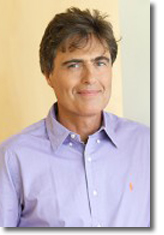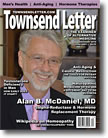Page 1, 2, 3
Follow-Up: How to Make Testosterone Treatment Safe
First, avoid overdosing. Overdose symptoms include oily skin, a dominating, aggressive "macho" behavior, an excessive sex drive, and a reddish face and upper torso.89 The redness is due to cutaneous vasodilatation and an increase in the number of erythrocytes.
Secondly, avoid the excessive conversion of testosterone to estradiol, the main female hormone. Testosterone achieves most of its beneficial effects by being converted in the target cells into either estradiol, the dominant female hormone, or dihydrotestosterone, the most masculinizing androgen. Whenever the conversion of testosterone into estradiol is excessive, the estradiol stimulates the proliferation of excessive amounts of fibrous tissue in the prostate (stromal hyperplasia), an effect that increases the size of the prostate and hardens it. After a year or more of this condition, prostate hypertrophy develops, which progresses into a compression of the urethra, causing dysuria and other signs of prostatism.90-92 Excess estradiol levels are even able to lift testosterone’s protective effects against proliferation of prostate cancer cells.93 Excessive levels of estrogen may also block testosterone‘s effects in the target cells by stimulating opposite effects, resulting, for example, in erectile dysfunction and coronary heart insufficiency.94-102
How to Avoid an Excessive Conversion of Testosterone into Estradiol
Avoid the most common causes:
- Stop drinking daily alcohol or drinks containing caffeine: One glass of alcohol or 2 cups of coffee or more per day increases the estradiol level by approximately 60%.102 This is the reason why the more coffee a man consumes, the greater the likelihood is that he had to undergo surgery for prostate hypertrophy.103 Stopping the drinking of these beverages or limiting their intake to a maximum of 2 days per week – on weekends, for example – reduces the estradiol level by 30 to 70%.
- Stop smoking: Tobacco abuse increases by more than 25% the estradiol level in the serum.104
- Lose weight: Overweight is characterized by an excess in fat mass. Fat is rich in the enzyme aromatase that converts testosterone into estradiol. This explains why estradiol levels are 30% to 100% higher in obese males.105 the volume of the prostate is also, for this reason, 30% to 100% greater in obese persons.106-108 Losing the excessive fat mass can decrease the estradiol level by 30% to 50% in obese men.108
- In about 50% of cases of high estradiol, an aromatase inhibitor, such as anastrozole, at −7 × 0.1–0.5 mg/day, might have to be given to reduce sufficiently the estradiol back to the optimal 20–28 pg/mL. Use of an aromatase inhibitor has been shown to reduce the prostate size.109 Lower levels than 20 pg/mL and higher levels than 28 pg/mL are linked with increased mortality in male patients with chronic heart failure.110 If this is true for male patients without disease, the estradiol level should be tightly monitored in the follow-up! Natural inhibitors, such as chrysin and DIM (diindolylmethane), are in most cases inefficient, may be due to their relatively poor absorption and/or bioavailability.111 Following one of my colleagues’ experience, bioidentical progesterone at 100 mg/day reduces the estradiol level by 30% but may occasionally and transiently, due to its calming effects, weaken the quality of an erection a few hours after intake. For this reason, the patient should take it after sex, not just before.
Conclusion
Research findings suggest that sooner or later all men get testosterone deficient. This age-related decline in testosterone secretion starts early, between ages 25 to 36, usually begins at levels already within the reference range of young adults, and has adverse effects on the male patient’s mind and health. These data also suggest that to avoid the development of adverse effects an early treatment with testosterone, starting between age 25 to 35 up to 40 at the latest should be recommended.
Notes .pdf
 Born in Antwerp, Belgium, Dr. Hertoghe practices his medicine in his clinic in Brussels. With his sister, Dr. Thérèse Hertoghe, they proudly represent the fourth successive generation of physicians working with hormonal treatments – and this since 1892 (after Eugène Hertoghe, former vice president of the Royal Academy of Medicine in Belgium, and Luc and Jacques Hertoghe, endocrinologists). Dr. Thierry Hertoghe devotes his life to the promotion of a better, patient-oriented, and evidence-based medicine. Born in Antwerp, Belgium, Dr. Hertoghe practices his medicine in his clinic in Brussels. With his sister, Dr. Thérèse Hertoghe, they proudly represent the fourth successive generation of physicians working with hormonal treatments – and this since 1892 (after Eugène Hertoghe, former vice president of the Royal Academy of Medicine in Belgium, and Luc and Jacques Hertoghe, endocrinologists). Dr. Thierry Hertoghe devotes his life to the promotion of a better, patient-oriented, and evidence-based medicine.
Author of numerous books, Dr. Thierry Hertoghe also travels a lot to take part in numerous conferences and congresses throughout the world. He co-organizes many of these specialized gatherings and holds important positions in several international and national medical organizations (which usually tend to fight against aging). He is the president of the International Hormone Society (over 2500 physicians), and of the World Society of Anti-Aging Medicine (over 7000 physicians), as well as the supervisor of two important postacademic trainings for doctors.
http://www.hertoghe.eu
Page 1, 2, 3 |
![]()
![]()
![]()





 Born in Antwerp, Belgium, Dr. Hertoghe practices his medicine in his clinic in Brussels. With his sister, Dr. Thérèse Hertoghe, they proudly represent the fourth successive generation of physicians working with hormonal treatments – and this since 1892 (after Eugène Hertoghe, former vice president of the Royal Academy of Medicine in Belgium, and Luc and Jacques Hertoghe, endocrinologists). Dr. Thierry Hertoghe devotes his life to the promotion of a better, patient-oriented, and evidence-based medicine.
Born in Antwerp, Belgium, Dr. Hertoghe practices his medicine in his clinic in Brussels. With his sister, Dr. Thérèse Hertoghe, they proudly represent the fourth successive generation of physicians working with hormonal treatments – and this since 1892 (after Eugène Hertoghe, former vice president of the Royal Academy of Medicine in Belgium, and Luc and Jacques Hertoghe, endocrinologists). Dr. Thierry Hertoghe devotes his life to the promotion of a better, patient-oriented, and evidence-based medicine.